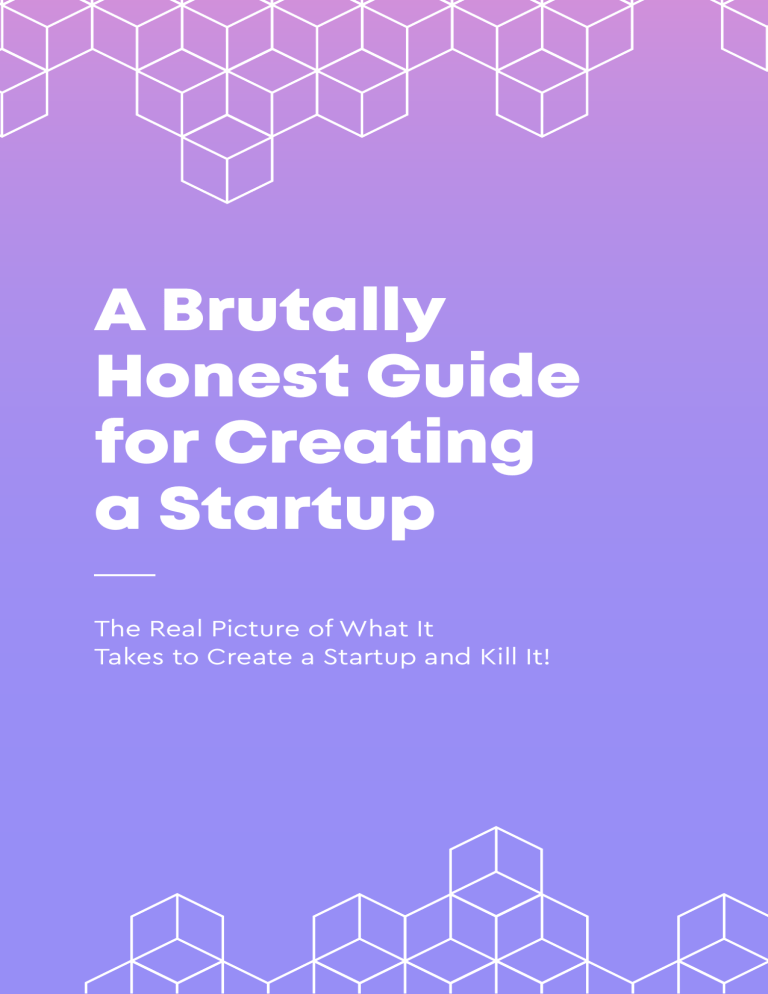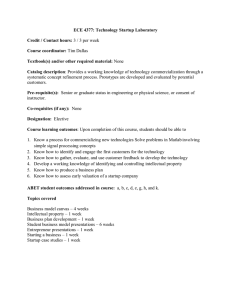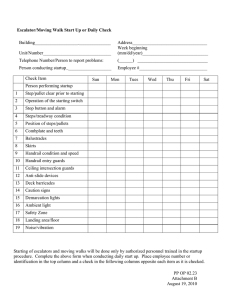
A Brutally Honest Guide for Creating a Startup The Real Picture of What It Takes to Create a Startup and Kill It! Table of Contents Dreamers are Not Doers Do You Want the Good News or the Bad News? All Entrepreneurs Stalk 2 2 3 Promising Territories 3 What Does Your Ideal Customer Look Like? 3 Unique is Not a Buzzword 3 Are you the Man with a Plan? 5 See Things Coming from a Mile Away 5 Keeps your Eyes on the Prize 6 Its Like Ammo in a Pitch 6 Can’t Escape the Eyes of the Law 7 Your Thoughts are Your Property 7 Avoiding Whatever’s Worse than a Prenup 7 Startups Don’t Purr without Moolah 8 Put Your Money Where Your Mouth Is 8 Are Any of Your Family or Friends Loaded? 8 An Angel Investor, In it for the Money 8 Get VC Backed 8 Borrow A Loan 8 Just Because You Like Matcha, Doesn't Mean Everyone Else Does 9 The Perfectionist 9 Leave Room to Pivot 9 It's Creative if it Sells 10 Creative vs. Effective 10 Build a Brand 10 Digital Has the Answers 11 Fortune Favors the Bold 12 A Brutally Honest Guide for Creating a Startup 2 Dreamers are Not Doers You may be the most innovative thinker in the room. Coming up with ideas may be your most brilliant trait. But that, in and of itself, does not make money. A sustainable business model makes money. In this guide, we will discuss what everyone’s too scared to tell you: ● ● ● ● 10 reasons why it's bad for you to sit on an idea Courage trumps everything Your entrepreneur friends lied to you—nobody waits for a sign Why the people whose businesses reach unicorn level started losing their hair a long time ago Call this an exposé on the trials and tribulations of building your own startup. Do You Want the Good News or the Bad News? If you consider yourself a wide-eyed aspiring entrepreneur, we can bet you have been one for a long time. There is no such thing as an aspiring businessperson. You either execute or wait so long that your idea gets executed by someone else. The bad news is that less than 50% of businesses make a profit. The good news is that as of January 2020, more than 600 businesses crossed the threshold to become a z unicorn. Building a business is more than just painting a fantastical big picture. It's about changing industry landscapes and usually involves a shit ton of sleepless nights and work-filled weekends. Read on to debunk the myths and uncover the truth about what it's really like to build a profitable startup. A Brutally Honest Guide for Creating a Startup 3 All Entrepreneurs Stalk As the new kid on the block, you need intel before you make an appearance. Experience is the best teacher, but nobody specified whose experience counts. By researching what existing players are doing in the market you can learn about best practices for your startup to follow. Find out what was behind the failures and successes of your competition and take note of how your startup could avoid or replicate those experiences. Your first goal should be to identify your competition, namely businesses selling similar products or services. Remember the businesses that you are monitoring now may not be the same ones that you will want to monitor once your startup enters the market. You should then consider industry trends. All companies have peaks and dips. By figuring out the patterns, you can use this insight to devise your post-launch operational strategy. Market analysis can provide insights beyond just finding out what your competitors are up to. Promising Territories Businesses are thriving on a global scale. What’s stopping you from growing globally? Research target regions and their various aspects to determine whether a new territory offers an opportunity for your startup. This is not as daunting as it seems. For example, you can simply check the traffic on platforms in the same industry. What Does Your Ideal Customer Look Like? Part of market research is being able to say, “Hey, I have this idea and I think your mom might want to buy it.” With the right research methods, you can actually get valuable information regarding your demographic. That allows you to instead say, “Hey I have this product and women from this region of North America who are between the ages of 30 and 50 would pay this much for it.” Now you know what your ideal customer looks like. By going a step further, you can also check what your competition’s demographic profiles look like. This can help you find your niche audience and may even help you differentiate to focus on the unique element of what you are offering. Unique is Not a Buzzword When you march into an incubator, you better know what your unique selling point is. The world already has Amazon, Facebook, and Google Maps. What value does your business bring to the table that it ensures its own market share? What is so different and better about your business idea? Can your startup be the new Zoom to Skype, the Postmates to UberEats? A Brutally Honest Guide for Creating a Startup 4 There is a term for this: Differentiation Strategy. Figuring out the one thing that makes your competition tremble is more than just a great starting point — it can be the emphasis of your business development and marketing, and could be the selling factor in your investor pitch. It is your competitive edge. More than 42% of startups fail because there was not a market need for the product they were offering. Imagine investing the time and energy into building a startup only to discover it didn’t serve anyone and wasn’t really needed. A Brutally Honest Guide for Creating a Startup Are you the Man with a Plan? Cue dramatic music. There are two types of people in this world: Those who have a plan and those who do not. Check out this survey from a few years ago. People who place all their bets solely on their one idea had a hard time securing investment; only 18% could do it. Fifty seven percent of them had to watch their business fail. On the other hand, the entrepreneurs who walked into a pitch with a plan had higher success rates for securing funding. Sixty four percent of these people saw their businesses grow. So why do businesses fail? Is it the money? Is it the plan? Is it the lack of moxie from the founders — an unwillingness to embrace sleepless nights? Is it because of one time where something went terribly wrong? We think the root of a failure can have many factors. But it often comes down to not having a plan. A business plan can pave your road to success. This path outlines a timeline of anticipated results. A good business strategy should summarize your business’s organizational structure and explain what the business offers.. The strategy should include the highlights of your market research and how the strengths of your business meet the opportunities in the market. Since startup businesses have no past financial data, they have to rely on realistic projections. With this data in your business plan, you are better equipped to stick to a measure of success. Creating a business plan requires a lot of work and hiring multiple experts. You may ask: If your business hasn’t even started making money yet, why should you bother with such a plan? See Things Coming from a Mile Away Knowing when to take what actions streamline the whole process of getting your startup off the ground. It allows you to plan for low and peak seasons in your industry so that it does not take you by surprise. A business plan gives you the courage you need. Every time you reach a projected milestone, you can relieve a bit of stress and grow more confident in your venture. 5 A Brutally Honest Guide for Creating a Startup Keeps your Eyes on the Prize A business plan prevents you from deviating from the path to success. It is easy to get stuck in a rut and be bogged down by the routine responsibilities of running a business. When you are spread thin, a business plan keeps you from the stagnancy of indecision. It’s Like Ammo in a Pitch When you walk into a pitch meeting, a business strategy is your star, story, and showstopper. Potential investors do not want to take your word for it. Use numbers and analytics to show them the potential your startup idea. Like they sa,y numbers do not lie! Well, that is unless they are projected numbers. Then yes, you need to back those your most charming A- game. Walk into that room with a face that says “I am confident and competent to do this.” 6 A Brutally Honest Guide for Creating a Startup Can’t Escape the Eyes of the Law One of the top 20 reasons startups fail is because they never paid attention to their legal framework. Your Thoughts are Your Property Before you even get into development it is important that you sort your idea as your property. Without intellectual property rights, anyone who might work under you can replicate your idea and all the work you have put into building your startup. Suing them would be akin to the suit the Winklevoss twins brought against Mark Zuckerberg. Think about the time it took you to mentally register the brothers’ names compared to the founder of the social network. That tells you all you need to know. Also, it is important to note what qualifies as your intellectual property. As we are well in the middle of the digital age, you can get intellectual property rights on things such as code, financial information, and other data that the management deems valuable. Avoiding Whatever’s Worse than a Prenup If things can turn sour with the person you got a painful wax for, they can most definitely go bad with someone you started a business with. You want ownership and responsibilities in clear ink. That’s where the equity and co-founder agreement comes in. Your agreement should also specify who owns what percentage of the business. It should also have a non-disclosure clause. That ensures that neither of you can walk away and start your own business in the same industry with the same structure and same product. There will be additional legal obligations as your business grows. The sooner you take care of your due diligence, the less hassle you will face later. 7 A Brutally Honest Guide for Creating a Startup Startups Don’t Purr without Moolah No matter what anyone says, a great idea alone won’t take your startup to the distance. It’s like getting a shiny car but never putting fueling it up. Put Your Money Where Your Mouth Is You could use your own savings. If you don’t believe in your business idea, no one will. Getting funding can be time-consuming and does put things on hold. If you can save the amount or already have it; you can skip the hassle of finding funding elsewhere, smoothing out the process of building your startup. Are Any of Your Family or Friends Loaded? If there is someone you trust and you think would likely invest in your idea, approach them. It is important that you give them the lay of the land on how you want to structure the business. Let them know about the opportunity in the market, as shown in your market research, and disclose how much you think the startup is going to make, as outlined in your business plan. It is also equally crucial that you draft an agreement with details on how you want to split ownership and revenue. An Angel Investor, In it for the Money If you know a local businessperson or someone who is looking to invest their money and reap the profits, do not hesitate to pitch to them. Again, legitimize everything and get your legal paperwork in order. Get VC Backed Do your research on the priorities of individual VC firms. Some are on the lookout for tangible products, others are geared to back Climate Tech. Do your homework and match the potential venture capital firm if you think they will be interested in your product. If your pitch begins with, “Sharks, I bring to you a most unique and innovative idea,” you better back that up with THE MOST unique and innovative idea. Don’t make your potential investor yawn within the first two seconds. We already talked about this. Remember Differentiation Strategy. In the corporate world, if you learn a big word, you have to use it at least 28 times in the conference room. (Don’t do that.) Borrow A Loan A bank loan is an option that you could take on as long as you are okay with putting up your assets as collateral. Banks usually like to see some financial data, so it would be wise to show them your business plan. 8 A Brutally Honest Guide for Creating a Startup Just Because You Like Matcha, Doesn't Mean Everyone Else Does You don't have to be a tech whizz to be able to run a business on the shoulders of a seamless product. You just need the right people. Part of product development is making sure that you are working with a team that understands your vision. That is how you build your dream product, but it won't necessarily make money. You want a team that not only shares your vision but also understands that they have to appeal to the market opportunity you are targeting. It may not be what you would design. But it is what the customer wants. The Perfectionist One of the biggest dilemmas of product design is being able to draw a line between your unique preferences and what is the cumulative preference of the masses. To you, it is perfection and surely you do not do anything half-assed. However, there is a way to meet halfway here. You must find ways to represent your brand without letting it overpower the solution or solutions your product is designed to provide. Research and development are a major part of product design. All startups are on tight budgets, but they must figure out a way to get this done. The results of this research will help you identify and plan what should be incorporated in a product. Leave Room to Pivot Product development does not end with the launch of a product. In fact, the first thing you want to test is how it does in the market. You’ll also want to have your team ready to make any necessary changes and additions. 9 A Brutally Honest Guide for Creating a Startup 10 It's Creative If It Sells “If you build it, they will come“ is the biggest hoax in the history of documented wisdom. As a startup, how can anyone know how amazing your product is if they have never tried it? That is why marketing exists. Here is the piece of wisdom that should be plastered everywhere: The smaller your marketing budget, the harder you will have to work. (Read: aka you will have to do a lot all by yourself.) If you took anything we said seriously, you have tons of market research. And thank God! A successful marketing strategy is not the same as outspending your competitors. Creative vs. Effective We have heard this so many times (though rarely by people who have tried and tested it that you need to come up with an “out of the box” idea so creative that your startup will become a viral sensation. What we think: a) your business is not a YouTube video; and b) every time someone says that, a marketing degree sets itself on fire. Don't get us wrong: Having a creative marketing team is the best thing you can ask for. And it is not always easy to get that. But the problem is that people think creativity and flashiness are one in the same. I The most brilliant and creative minds, however, start from a point of problem solving so that they can help you achieve YOUR goals by sticking to the utility of YOUR limited resources. Simply put, a grand marketing strategy is one that is effective. Build a Brand Your brand does not begin and end with a logo and a font. Your brand is what you stand for, what unique proposition you bring to your customer base, and how consistent your standards are. In fact, 73% of customers acknowledge a brand for its responsive customer service. To make it even simpler, ask yourself about purpose. What can you help your customers achieve that no one else can? Building a brand identity should offer some direction to yourmarketing efforts in year one. A Brutally Honest Guide for Creating a Startup Digital Has the Answers Your potential customers are likely addicted to a screen and probably using one even as you read this. . Unlike conventional marketing, social media algorithms allow you to pinpoint exactly who in the world should and will see your message. Digital marketing is, at its core, efficient and effective. You pay every time someone interacts with your ad, giving you a lead that you can chase for conversion. It helps to target your audience according to interests and profile. You can be assured that those seeing your ad are more likely to need your product, and you don’t have to pay just to cast a large net with the hope you reach the target audience. . Digital marketing means you have access to a plethora of marketing strategies, includingcontent marketing, SEO, PPC, influencer marketing, and email marketing. Digital marketing gives you the freedom to amalgamate these strategies into a single campaign for your startup. 11 A Brutally Honest Guide for Creating a Startup 12 Fortune Favors the Bold At the end of the day, all you really need is a backbone. As Elon Musk said, “Being an entrepreneur is like chewing glass and staring into the abyss of death.” But he also said, “Work like hell! You will achieve in 4 months what it takes them a year.” Starting your own business is one of the most grueling experiences you can have, but it doesn’t have to be the most mind numbing. Every time you put in hard work, it rewards you. That can be the best feeling in the world. Going into it, you must know that a business has inevitable ups and downs. Even if your product gains traction post-launch, it is never a breeze. If this e-book made you want to say, “fuck off” to your excuses and start your own startup project, we have been searching for you! ConvrtX is an award-winning incubator that offers you a complete suite of services, building your dream into a feasible software-based business based on a sustainable business strategy that we develop for you. Our efforts are designed with the goal of scaling to unicorn level. If you have an idea for a mobile application, hit us up at www.ConvrtX.com What are you waiting for? Just give us a call.






